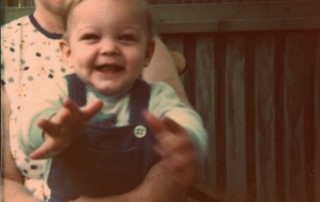Our brains are wired to look for the negative. Why is this? Stated simply, it’s about survival. Think about it: if you lived in the jungle and on your way home at the end of the day, if you didn’t stop to notice the pretty flowers, would it endanger you? No. But, if you didn’t notice the poisonous snake or the scary tiger or the cave-to-cave salesman, then you might actually be in danger. Thus, it is advantageous to our survival to keep an eye out for negative, unsafe, dangerous things. However, we don’t live in the jungle anymore and the threats to our survival aren’t quite as literal anymore. We haven’t yet gotten rid of this natural instinct however; it has just transferred to other threats, social threats. We look for signs of rejection, exclusion, not belonging, not measuring up, etc. We do so because belonging to the group equals safety. Or at least it used to; that’s another fossil from our pre-industrialized past. With the development of cities and technology, a man can actually be an island and survive. I’m not saying he will be the happiest man, but he will be alive. So, how do we overcome […]
Things I Was Wrong About, Vol. 3: I Don’t Need Any Help
Independence runs fiercely deep in my family. The ability to shrug off pain and keep going is a virtue valued by many, including those whom I love. I remember one time (of several such instances) when my dad and I were working together clearing some brush, using a wood-chipper. Let me assure you, this story doesn’t end as badly as you might think it does, as the wood-chipper plays a secondary role. Anyway, as my dad was feeding a tree branch into the chipper, the teeth grabbed it and sucked it in quicker than he was anticipating. Some of the auxiliary branches of the main branch were rapidly pulled forward, slicing across his face. He grunted and put his hand over his eye. I looked to see blood seeping between the fingers of his gloved hand. I had no idea what the severity of his injury was and I stopped to ask if he was ok. He responded by vigorously rubbing the blood out of his eye, revealing a gash across his eyelid. The gash quickly filled with blood again, which he wiped again. Then, instead of cleaning the wound and getting some medical attention, he just picked up the […]
I Want a Ladder for my Birthday (A Short Story)
Tim was four years old. His mom was a lot older than that. So was his dad. His brother Jeff was older too. Tim’s birthday was coming up soon. He knew exactly what he wanted. “I want a ladder for my birthday,” Tim told his mom. She didn’t hear because she was busy with “an important phone call”. Tim wondered why the phone call was so important. “I want a ladder for my birthday,” Tim told his dad. He didn’t hear because he was heading out the door to meet with “clients”. Tim wondered who “clients” was. “’Clients’ must be important too,” thought Tim. “I want a ladder for my birthday,” Tim told his brother Jeff. Jeff didn’t hear him because he was too busy ignoring everyone who wasn’t on TV. “I wish I was on TV,” thought Tim. At dinner, Tim told his parents, “I want a ladder for my birthday.” “That’s nice,” said his mom, who was reading a magazine about important people. “Hmmm,” said his dad, who was looking at something important on his computer. Jeff said nothing because Tim wasn’t on TV. Tim drew a picture of a ladder and colored it. He got some tape […]
A Control Budget: Picking Your Battles
Here’s an idea: We are all born with an instinct to resist other people’s attempts to control us. This instinct is designed to help us stay safe. To one extent or another, anytime something bad has happened in our lives, it is when we are not in control. The brain learns to associate this state of powerlessness with negative events, such as pain and danger. The greater the pain and danger associated with powerlessness, the greater the brain’s drive to avoid that state. In other words, with an awareness of the origins of this association, we can understand the reflexive statement, “you’re not the boss of me” in a whole new context. Negative events don’t just include instances of physical harm and danger, but also emotional harm and danger. To a young child, few things are as instinctively dangerous as disapproval from a caregiver or trusted loved one. Parental attempts to control, no matter how well intended, are usually rebuffed, especially as the child begins to develop a sense of self somewhere around 18 months old. This is what we refer to as the terrible twos. It’s not a coincidence that as the child learns that they can resist parental […]
MY ADHD Story
In 2008, I attended a workshop given by Dr. Gabor Mate. He is a renowned expert in addiction, addiction treatment, and the impact of childhood stress on the developing brain. Needless to say, I learned more than I could write down and ultimately decided to put my pen down and just listen. What I did write down were the names of the books he has written. I then went and bought all four of them and started reading them all at once (hint #1). They were all full of awesome insight and scientific ammunition. Anyway, one of the books was called “Scattered Minds”, and it was a book about ADHD (Attention Deficit Hyperactivity Disorder). Since so many of my clients have been (or should have been) diagnosed with ADHD as children, I thought I should learn more about it. What I discovered as I madly devoured this book, was that I displayed almost all of the characteristic signs of ADHD and had done so throughout my life. I realize this is a common experience, even the subject of research, called “psych student syndrome” where people tend to over-identify with lists of signs and symptoms and diagnose themselves with every condition […]
Things I Was Wrong About, Vol. 1
Things won’t get better I’ve experienced darkness in my life. Deep darkness. When I was a kid, I was in boy scouts. One time, on a day trip, our scout leaders took us to an abandoned mine shaft. I know, this story has a very promising beginning, just like the last one. Because we didn’t know anything, and apparently neither did our leaders, we wandered into the mine shaft, deeper and deeper into the mountain. Our way was lighted by an actual torch, not a flashlight or lantern. One of our leaders, who just happened to be the one holding the torch and also happened to have the most severe case of ADHD of the bunch of us, thought it would be a funny trick, once we were several hundred feet into the mine shaft, to knock the torch on the ground, extinguishing the flame. The tunnel that we were exploring had curved to the left, meaning that when the torch was gone, the entrance to the shaft was out of sight around a corner, leaving us with absolutely no light. In review, we were 12 year old kids in an abandoned mine shaft and it was so dark, we […]
10 Favourite Quotes from Dr. Gabor Mate
In no particular order, I present 10 of my favourite pieces of wisdom from Dr. Gabor Mate, bestselling author of “Scattered Minds“, “When the Body Says No”, “In the Realm of Hungry Ghosts”, and co-author of “Hold on to Your Kids”. 1. It is impossible to understand addiction without asking what relief the addict finds, or hopes to find, in the drug or the addictive behaviour. There is a purpose to all behavior and feelings. We just need to look a little deeper to find it. On the surface, addictive or self-destructive behavior seems illogical but if we focus its benefits, few though they may be, we will be able to unlock the mystery of the behavior and put ourselves in a position to change it. 2. The DSM … defines attention deficit disorder by its external features, not by its emotional meaning in the lives of individual human beings. I’ve noticed this in discussing the symptoms with doctors, even those who specialize in treating the condition. The list of symptoms and signs makes very little room for the emotional impact of poor time management, poor attentional control, lack of follow-through, impulsive behavior, and constant restlessness. The list doesn’t touch […]













Recent Comments